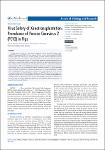Virus Safety of Xenotransplantation: Prevalence of Porcine Circovirus 2 (PCV2) in Pigs
Heinze, Julian
Plotzki, Elena
Denner, Joachim
Porcine circovirus 2 (PCV2) is the causative agent of a whole series of diseases in pigs, called PCV2 diseases (PCVD). The most relevant of them is the systemic disease (PCV2-SD), formerly called post weaning multi systemic wasting syndrome (PMWS). Xenotransplantation using pig cells, tissues and organs is under development to overcome the shortage of human transplants for the treatment of tissue and organ failure. Xenotransplantation requires functional cells, tissues or organs from healthy animals and therefore the donor pigs should be free of PCV2. Selection of PCV2-free animals will also prevent transmission of the virus to the human recipient. Using a PCR method, (i) Göttingen Minipigs, which are well characterised and which were already used in pig to non-human primate xenotransplantations, (ii) newly generated Aachen Minipigs, (iii) genetically modified pigs generated for xenotransplantation, (iv) pigs from a slaughterhouse and (v) pigs from a German farm were screened for PCV2. 50% of the Aachen minipigs and 14% of Göttingen minipigs were PCV2 positive, but the animals were apparently healthy. None of the slaughterhouse animals, the farm animals and the genetically modified animals were positive for PCV2, because they had been vaccinated. The data indicate that PCV2 may be found in healthy pigs even under SPF conditions, and that vaccination is a powerful tool to prevent infection.
No license information

